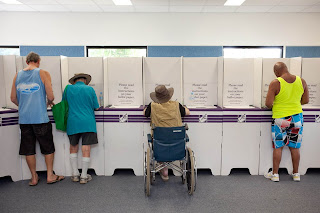Sydney has to be one of the best places in the world to bring in the New Year. There's nothing quite like the fireworks going off around the Harbour.
It's estimated 1.6 million people gather around the various vantage points around the Harbour which makes for a busy night.
So how do you snag a top spot to enjoy the spectacle? Well the City of Sydney has put together some great information to help plan your visit to the Harbour.
They have produced vantage point information including mobility accesss and accessible toilet information to selected locations. There's also the official 2013 Sydney New Year’s Eve App.
There are a number of designated accessible viewing areas for people with disability to enjoy the event with their family or friends.
For further enquiries, or to register your interest, please contact the relevant person below:
If you're not able to make it to somewhere around the Harbour to watch the fireworks, you can watch on ABC 1 and this broadcast will include live closed captions.
2RPH will also be providing an audio description from 8:30pm – 10:00pm and 11:30pm – 12:30am on 1224AM.
If you would like to find out more general information, including road closures, accessibility for public transport users as well as information on accessible accommodation visit:
http://www.sydneynewyearseve.com/accessibility/
It's estimated 1.6 million people gather around the various vantage points around the Harbour which makes for a busy night.
 |
| Image courtesy of City of Sydney |
They have produced vantage point information including mobility accesss and accessible toilet information to selected locations. There's also the official 2013 Sydney New Year’s Eve App.
There are a number of designated accessible viewing areas for people with disability to enjoy the event with their family or friends.
For further enquiries, or to register your interest, please contact the relevant person below:
Location
|
Contact Name
|
Contact Details
|
Cahill Expressway and
Ballarat Park, Pyrmont
|
Paul Nunnari
|
|
Pirrama Park , Pyrmont
|
Danielle Miller
|
02 9265 9325
|
Sydney Opera House
|
Jenny Spinak
|
02 9250 7175
|
If you're not able to make it to somewhere around the Harbour to watch the fireworks, you can watch on ABC 1 and this broadcast will include live closed captions.
2RPH will also be providing an audio description from 8:30pm – 10:00pm and 11:30pm – 12:30am on 1224AM.
If you would like to find out more general information, including road closures, accessibility for public transport users as well as information on accessible accommodation visit:
http://www.sydneynewyearseve.com/accessibility/










